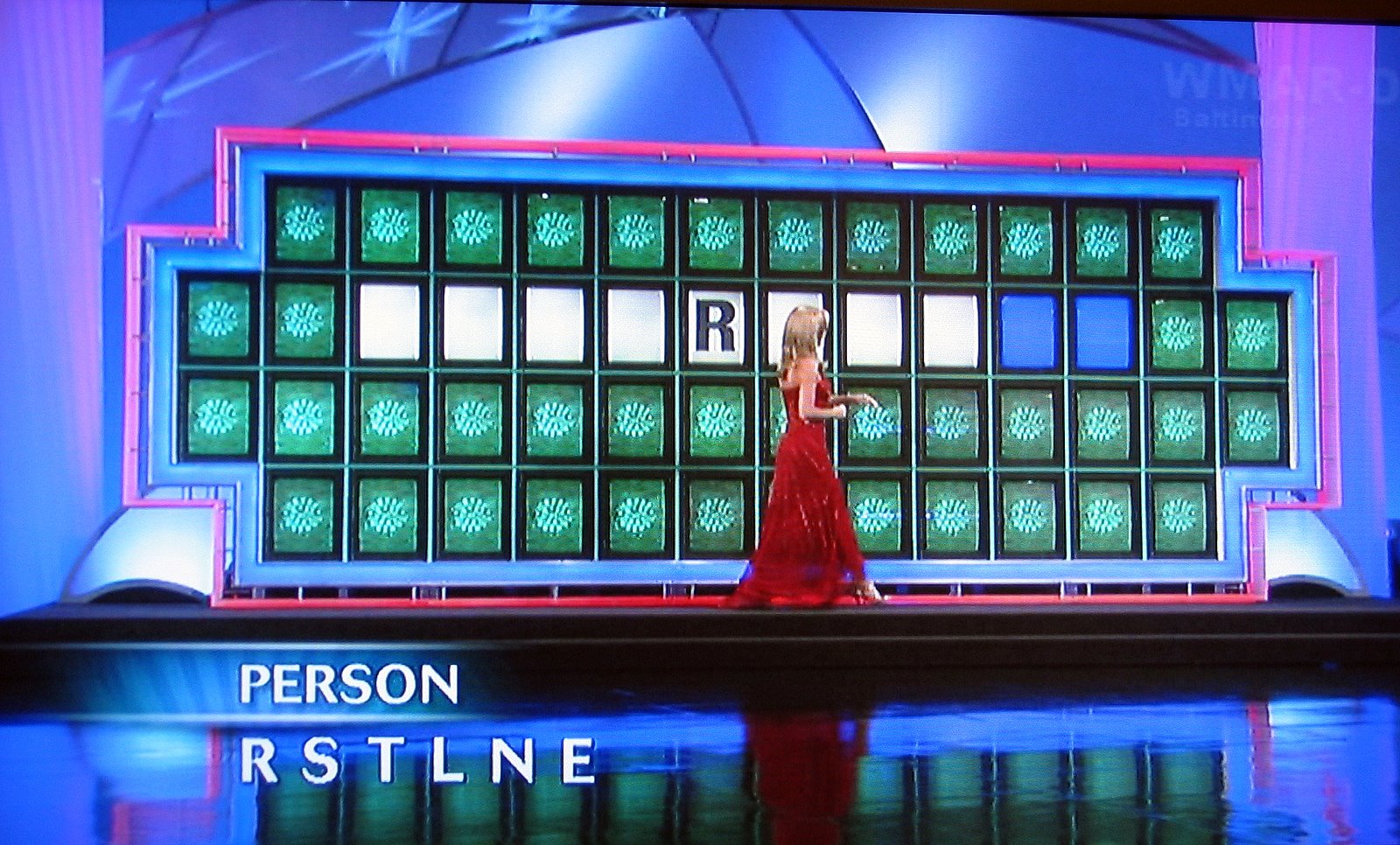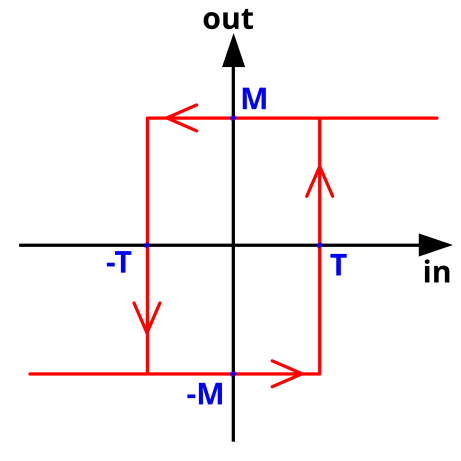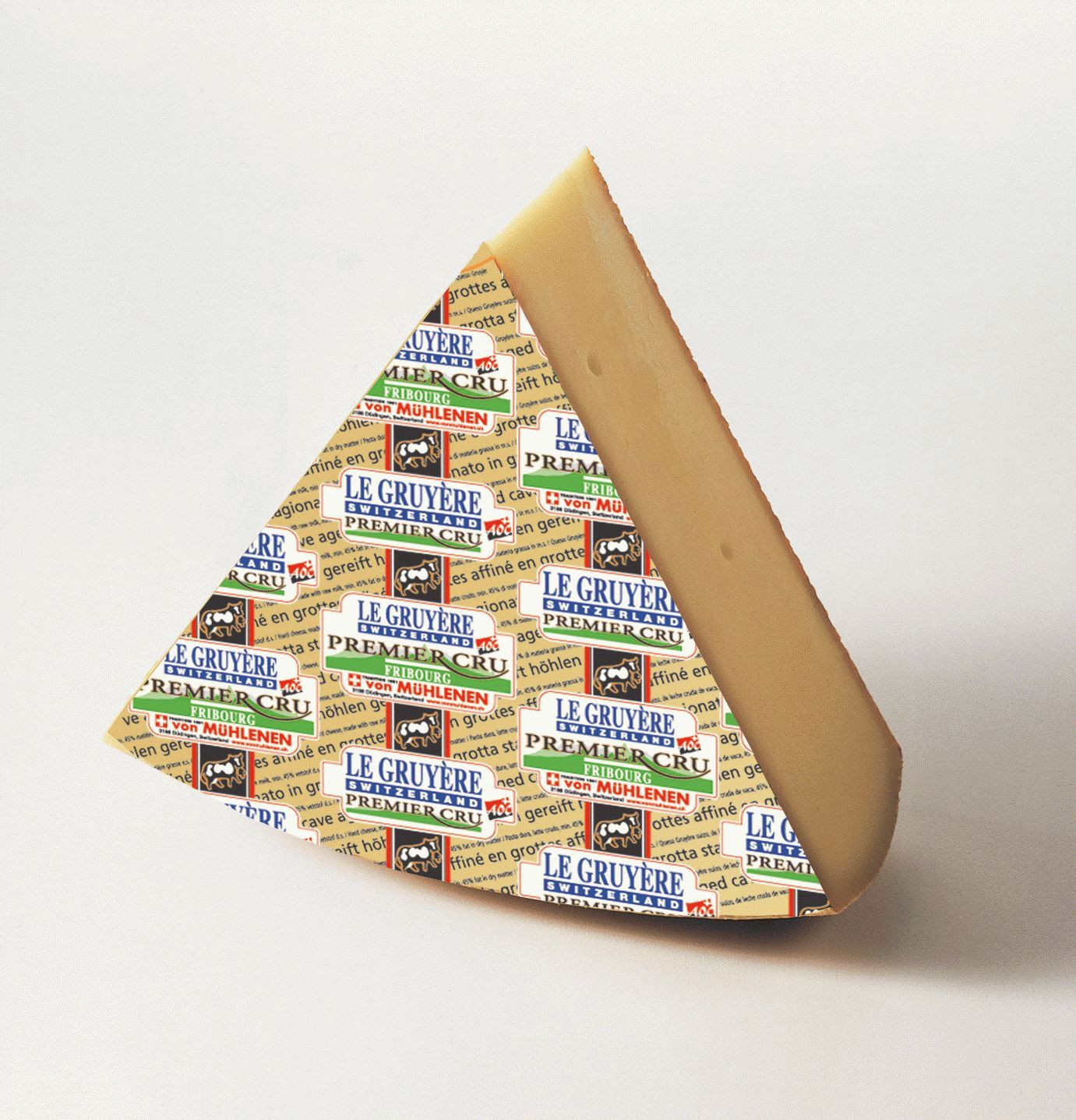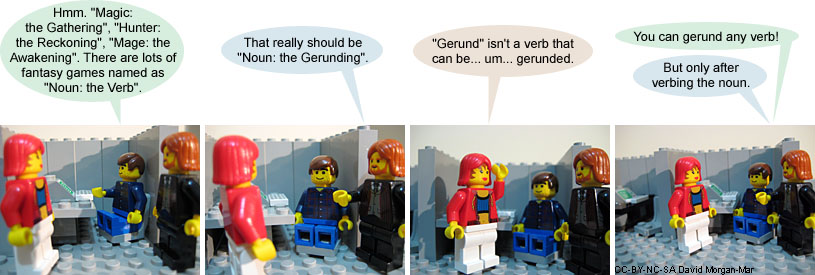 3 "last minute" idiomatic etymologies to round off 2009:
3 "last minute" idiomatic etymologies to round off 2009:Thursday, December 31, 2009
Monday, December 28, 2009
Thursday, December 24, 2009
goodness gracious, ignis pilas magnus
by
Andrew
 i started this post about fatuous, an adjective that means "foolish" or "witless". but a nerdy connection took me deep into its fun etymology.
i started this post about fatuous, an adjective that means "foolish" or "witless". but a nerdy connection took me deep into its fun etymology.Monday, December 21, 2009
a presence i havent felt since...
by
Andrew
one of my favorite words is aposiopesis. a friend what told me i use a specific example of aposiopesis which he called the "I.T. trail-off."
Thursday, December 17, 2009
caseus sto, per se
by
Andrew
per se seems to be a phrase people never officially learn but pick up the general meaning by hearing it used. I dont think it is being used incorrectly, per se, but it is always good to understand the meaning behind the words.
Monday, December 14, 2009
know your vus
by
Andrew
i suspect déjà vu is not a new word for anyone, but the psychological phenomenon has two lesser known cousins: jamais vu and presque vu.
Thursday, December 10, 2009
keep it secret, keep it safe, keep it dry
by
Andrew
to an engineer "hermetic" means airtight (i.e. a waterproof camera needs an hermetic seal), and this meaning can make sense when you make the connection between "hermetic" and the greek god hermes.
Monday, December 07, 2009
you complete me
by
Andrew
this will be fun: i bet most people dont even realize (i didnt) that compliment and complement are two separate words with different meanings and spellings.
Thursday, December 03, 2009
wait till you read this
by
Andrew
until and till are both prepositions that mean the same thing (before some milestone), but "till" has existed for longer, and should be used instead of "'til" with an apostrophe.
as a side note till can also be a noun (like a cash register) or a verb (till dirt for gardening)
as a side note till can also be a noun (like a cash register) or a verb (till dirt for gardening)
Monday, November 30, 2009
the bird is more than the word
by
Andrew
there are some posts that i just very excited about when the topic is something i learned that just blows my mind (papapa oo maomao). such is the case for how pidgin, the IM client that combines AIM, MSN, Yahoo, google talk, and others, got its name.
Thursday, November 26, 2009
Monday, November 23, 2009
jerk and jounce
by
Andrew
Thursday, November 19, 2009
Monday, November 16, 2009
i use 'alright' alot...
by
Andrew
my sister solicited a post about "alright" vs. "all right." this seemed a similar issue to "alot" vs "a lot," and i knew already that "alot" was not a word. the bottom line is that "alright" is technically not a word either, but people generally use "alright" and "alot" enough that they are perfectly acceptable in casual conversation (many popular song titles feature the word "alright"), though it would be best to avoid them in anything formal.
Thursday, November 12, 2009
at 58,139.53 words per pound, this dictionary is the best kind of dense
by
Andrew

99.9% of the time i have no need for a physical dictionary. google polls dozens of online dictionaries to put quick definitions at your fingertips, and you don't even need to know alphabetical order!
but when the internet is down, or you have a family of hardcore scrabble/bananagrams enthusiasts, a hard dictionary is essential- and the bigger the better. you hate to have someone challenge your obscure word that you know is real only to be stymied by an inadequate source.
my mom found this giant gem of a resource at goodwill for $6.99 marked down from its original 1996 price tag of $100. this behemoth contains 300,000 entries on 2,256 pages and has settled many arguments over the existence of seeming nonsense words.
Monday, November 09, 2009
intro to pronunciation
by
Andrew
/lɪŋˈɡwɪstə.risɪs/
everytime i see a pronunciation guide i am amazed that anyone can decipher it
everytime i see a pronunciation guide i am amazed that anyone can decipher it
Thursday, November 05, 2009
nat'lnauts
by
Andrew
i like yahoo answers. it seems that every instance of "d'yaver wonder why..." has already been asked an answered.
my question was "what is the difference between an astronaut and a cosmonaut?" has been answered dozens of times:
[Difference between cosmonaut and astronaut? via Yahoo Answers]
my question was "what is the difference between an astronaut and a cosmonaut?" has been answered dozens of times:
Their nationality:i also learned that chinese spacefolk are called taikonauts.
The difference is merely nominal to differenciate [sic] the space explorers of either side of the iron curtain (Space Race was one of the most remarkable chapters of the Cold War). Thus, Astronauts (In greek 'Navigators of the stars') were those coming from the USA alignment, and Cosmonauts ('Navigators of the universe') were the ones from the Soviet bloc.
[Difference between cosmonaut and astronaut? via Yahoo Answers]
Monday, November 02, 2009
pachedermata
by
Andrew
i have heard the word "pachederm" (pronounced like PACK-uh-derm) used in reference to elephants, but i never questioned where this word came from or whether it applies to just elephants. i considered it analogous to canine, feline, bovine, etc. for relating to dogs, cats, cows, etc. it turns out the latin word "pachedermata" means "thick-skinned" and applies to elephants, rhinoceroses, and hippopotamuses! they all are thick skinned.
Thursday, October 29, 2009
something is missing…
by
Andrew
i knew that a set of three periods was called an ellipsis, but i always found it to be an odd name because it sounds to much like 'ellipse' (a synonym for oval.)
but ellipsis actually has three meanings:
but ellipsis actually has three meanings:
Monday, October 26, 2009
[not my bad]
by
Andrew
you may have encountered a quote with the word [sic] in square brackets and wondered what it was.
Thursday, October 22, 2009
backronyms actually circumvent knowledge of rare original names to yield meaning
by
Andrew
backronym is a portmanteau combining "back" (i.e. 'retro-') with "acronym" (i.e. initialism - a word where each letter stands for another word) to describe words that have a made up acronym after the original word already exists.
Wednesday, October 21, 2009
fun grammar quiz
by
Andrew
today's new york times had their fourth installment of their little grammar quiz series to test your knowledge. i failed, catching only 4/9 grammar errors, so i will preface the link with this hint: none of the mistakes are punctuation related (as i suspected my five incorrect answers were)
red pencils ready? via new york times
red pencils ready? via new york times
Monday, October 19, 2009
sahara sundae
by
Andrew
i grew up with the mnemonic that you want "two scoops of 's' in dessert!" to remember that dessert has an extra 's' and the big sandy place, a desert, does not.
a friend of mine told me another that made me chuckle: "'desserts' spelled backwards is 'stressed'"
a friend of mine told me another that made me chuckle: "'desserts' spelled backwards is 'stressed'"
Thursday, October 15, 2009
speaking of segues...
by
Andrew
there are certain words that you know how to use in conversation, and other words you can spell, but sometimes you cannot make the connection that a word you say and a word you can spell are actually the same word.
personal example: for the longest time i pronounced epitome like ep-i-TOME (tome being one syllable, like the story) even though i knew of the existence of "e-pit-uh-mee." i knew independently what each meant but it still took awhile to realize the word i was spelling correctly and the word i was pronouncing correctly were the same word.
personal example: for the longest time i pronounced epitome like ep-i-TOME (tome being one syllable, like the story) even though i knew of the existence of "e-pit-uh-mee." i knew independently what each meant but it still took awhile to realize the word i was spelling correctly and the word i was pronouncing correctly were the same word.
Monday, October 12, 2009
enis ratulo sounds legitimately german
by
Andrew
following up on a previous post regarding etaoin shrdlu, here is a list of similar "names" created using the most frequent letters (in order) in other languages:
Thursday, October 08, 2009
Ĉu vi parolas Esperanton?
by
Andrew

there is a made up language called esperanto that, while not officially accepted by any country, is spoken by an estimated 100,000-2,000,000 people around the world.
Thursday, September 24, 2009
Monday, September 21, 2009
get grammar tips via twitter
by
Andrew
if you like little grammar tidbits, @thatwhichmatter may be for you. at 140 characters or less, some posts are a little difficult to decipher, but the advice is sound. keep in mind you do not need to have a twitter account to consume these tweets; RSS works too.
sample tweet:
sample tweet:
HISTORIC/HISTORICAL? Historic: historically significant. Historical: occurred in history (sig. or not). Most prefer "a", as in "a historic."@thatwhichmatter [via lifehacker]
Thursday, September 17, 2009
famous as a moon-jumping cow
by
Andrew
i like to think i have a good handle what what is common knowledge, but in the off chance that this is new information to someone:
Monday, September 14, 2009
no one expects the gnaborretni
by
Andrew
‽=?!
another underused punctuation mark, the interrobang is an exclamation point (sometimes referred to as a "bang") overlayed with a question mark (a.k.a. an interrogative point) and it is used in the exact way these two symbols act when they are together: excited inquisition or disbelief (symbolic portmanteauism?).
another underused punctuation mark, the interrobang is an exclamation point (sometimes referred to as a "bang") overlayed with a question mark (a.k.a. an interrogative point) and it is used in the exact way these two symbols act when they are together: excited inquisition or disbelief (symbolic portmanteauism?).
Thursday, September 10, 2009
the best music from the 80's, 90's, and... uh... TODAY!
by
Andrew
now that the last year of the decade is winding down, we are finally coming to a consensus on the ubiquitous question (why was this not solved in 1901?):
"what do we call this decade?"
"what do we call this decade?"
Monday, September 07, 2009
apartheid
by
Andrew
i have seen this word an abnormal number of times in the past month and i had no idea what it was or even how to pronounce it. after learning its meaning, i now understand much better why i have been seeing it so frequently, as it is the allegorical basis of the movie district 9.
Thursday, September 03, 2009
etaoin shrdlu
by
Andrew
 for anyone raised on wheel of fortune, you may or may have not come to the same conclusion that i did. i wondered "why do they give the contestant R,S,T,L,N, and E for the final puzzle? what is special about these letters?" combining my young knowledge that these were all worth one point in scrabble, i figured that they gave you these letters because they were all common letters, and i further assumed these must be the most common letters (excepting the vowels, which i knew were mostly more common but would make WoF puzzles too easy)
for anyone raised on wheel of fortune, you may or may have not come to the same conclusion that i did. i wondered "why do they give the contestant R,S,T,L,N, and E for the final puzzle? what is special about these letters?" combining my young knowledge that these were all worth one point in scrabble, i figured that they gave you these letters because they were all common letters, and i further assumed these must be the most common letters (excepting the vowels, which i knew were mostly more common but would make WoF puzzles too easy)Monday, August 31, 2009
this has been driving me crazy for over a fortnight!
by
Andrew
there are words and phrases that are used incorrectly that mean the opposite of what the speaker intends. there are other words and phrases that, over time, come to mean the opposite of what they originally meant. but then there are some words that exist with opposing definitions simultaneously, and they just blows my mind!
Thursday, August 27, 2009
Monday, August 24, 2009
is that sarcasm؟
by
Andrew
 the symbol seen here, known as a percontation point, irony mark, snark, or zing, is also the symbol used in this blog's logo.
the symbol seen here, known as a percontation point, irony mark, snark, or zing, is also the symbol used in this blog's logo.clearly a backwards question mark, this symbol first appeared in the late 1500s at then end of a rhetorical question, and was used to denote general irony at the end of the 19th century, but it has never been widely used.
my personal thought is that the world is finally ready for this symbol, and in fact we need it. this symbol could be a powerful tool for implying sarcasm (a form of verbal irony) in instant messaging, texting, and general textual forms of communication.
as a last note, because this symbol is represented by simply using an arabic question mark, it can really mess with your computer when you type it... it can make you type backwards and it is difficult to delete, so be warned؟
Thursday, August 20, 2009
qualtification of detection
by
Andrew
i play pretty fast and loose using these interchangeably and synonymously with perceivable, noticeable, etc, but apparently they are all distinct adjectives for qualtification of things we can detect, feel, or measure:
- appreciable - highly noticeable or definitely measurable (from latin "appretiare" meaning "to appraise")
- perceptible - can be discerned to a minimal extent (e.g. "barely" or "scarely")
- palpable - quite noticeable via the senses despite lacking physical substance ("a palpable chill in the air")
- tangible - capable of being handled or grasped, either physically or mentally
Monday, August 17, 2009
qualtify
by
Andrew
oversimplified to a fault for the purpose of illustrating the difference:
qualify - what kind?
quantify - how much?
usually only one of these is used to measure something, but there are occasions when it is necessary to qualify AND quantify something. in these cases it is tedious to always spell out both words, so may i suggest
qualtify - how much of which kind?
a great example of a portmanteau, this word appears frequently in a liminary google search as a typo ("do i qualtify for this home loan?" "high qualtify speakers"), but i do not see any legitimate uses in the results.
this post may seem frivilous but will be useful for my next post ;-)
qualify - what kind?
quantify - how much?
usually only one of these is used to measure something, but there are occasions when it is necessary to qualify AND quantify something. in these cases it is tedious to always spell out both words, so may i suggest
qualtify - how much of which kind?
a great example of a portmanteau, this word appears frequently in a liminary google search as a typo ("do i qualtify for this home loan?" "high qualtify speakers"), but i do not see any legitimate uses in the results.
this post may seem frivilous but will be useful for my next post ;-)
Thursday, August 13, 2009
sporks and brangelinas
by
Andrew
a portmanteau is a sort of "frankenword;" two or more words combined together to amalgamate their individual attributes with functional (and sometimes humorous) intent. the joke here is that "frankenword" is itself a portmanteau, adding the patched-together qualities of frankenstein's monster to a word.
etymological excerpt from wikipedia:
etymological excerpt from wikipedia:
other common portmanteau words include spork, bridezilla, labradoodle, brangelina, and wikipedia! (don't let your mind melt while reading the wikipedia entry on wikipedia)The usage of the word "portmanteau" in this sense first appeared in Lewis Carroll's book Through the Looking-Glass (1871), in which Humpty Dumpty explains to Alice the coinage of the unusual words in Jabberwocky:
"‘Slithy’ means ‘lithe and slimy’... You see it's like a portmanteau—there are two meanings packed up into one word"
"‘Mimsy’ is ‘flimsy and miserable’ (there's another portmanteau ... for you)".
Monday, August 10, 2009
Vibrato vs Tremolo
by
Andrew
my personal experience with these two words is that most everyone knows vibrato and uses it to describe the way opera singers sing. but i had never heard of tremolo until very recently when i came across it while trying to achieve a vibrato effect in audacity.
i started to wonder why the same effect had two different names so i started to inquire into tremolo vs vibrato via google. i only got to "tremolo v" and it autosuggested exactly what i was looking for. it turns out i was incorrectly assuming the two words were the same. the auditory difference is very subtle but the definition is quite clear.
vibrato, italian for vibration, is the rapid fluctuation in pitch, while
tremolo, also italian (arent all musical words?) means "trembling," and while it can refer to rapid strumming or drumming, it more generally means a rapid fluctuation in amplitude.
the more i think about it, im not sure i can tell the difference when i hear an opera singer who is using vibrato (yet further investigation shows it clearly is):
i started to wonder why the same effect had two different names so i started to inquire into tremolo vs vibrato via google. i only got to "tremolo v" and it autosuggested exactly what i was looking for. it turns out i was incorrectly assuming the two words were the same. the auditory difference is very subtle but the definition is quite clear.
vibrato, italian for vibration, is the rapid fluctuation in pitch, while
tremolo, also italian (arent all musical words?) means "trembling," and while it can refer to rapid strumming or drumming, it more generally means a rapid fluctuation in amplitude.
the more i think about it, im not sure i can tell the difference when i hear an opera singer who is using vibrato (yet further investigation shows it clearly is):
Thursday, August 06, 2009
prolific
by
Andrew
i once got into an argument over the definition of prolific with a friend whilst playing super smash brothers.
for some reason i had always associated 'prolific' with 'undying' or 'living a long time' e.g. methuselah was very prolific, living to be 900 years old, or rasputin was prolific because he just wouldn't die despite everyone's best efforts.
i lost the argument; prolific as my friend defined it was "intellectually productive" i.e. used to describe an author who had written many books.
what reminded me of this was today seeing a definition for the word philoprogenitive which had 'prolific' listed as a synonym. philoprogenitive (philo- meaning "having an affinity for" and progenitus meaning "offspring") means tend to produce many offspring and can refer to plants or animals (e.g. a successful apple tree is very philoprogenitive)
i looked deeper into the definition of prolific and it turns out prolific means this exact same thing - tending to have bountiful offspring/fruit production. in the case of a writer or artist, the 'fruits' of their labor is their books and artworks. somehow the word formed this niche and the general definition faded so it now usually only refers to somebody who produces many intellectual works.
for some reason i had always associated 'prolific' with 'undying' or 'living a long time' e.g. methuselah was very prolific, living to be 900 years old, or rasputin was prolific because he just wouldn't die despite everyone's best efforts.
i lost the argument; prolific as my friend defined it was "intellectually productive" i.e. used to describe an author who had written many books.
what reminded me of this was today seeing a definition for the word philoprogenitive which had 'prolific' listed as a synonym. philoprogenitive (philo- meaning "having an affinity for" and progenitus meaning "offspring") means tend to produce many offspring and can refer to plants or animals (e.g. a successful apple tree is very philoprogenitive)
i looked deeper into the definition of prolific and it turns out prolific means this exact same thing - tending to have bountiful offspring/fruit production. in the case of a writer or artist, the 'fruits' of their labor is their books and artworks. somehow the word formed this niche and the general definition faded so it now usually only refers to somebody who produces many intellectual works.
among and amongst
by
Andrew
among and amongst are both the same word! i was wondering why we have both, and if one was not actually a real word (like irregardless) but it turns out amongst is used commonly in the UK and among is more common in the US. this is similar to many other words such as colour/color, shoppe/shop, etc. this pairing is notable because the two words are not only spelled differently, but pronounced differently.
can you think of any others like this? how about aluminum/aluminium?
can you think of any others like this? how about aluminum/aluminium?
etymology of blog title
by
Andrew
just as a small first note, i will explain the title of this blog: "linguisteresis"
linguistics is the study of language, no suprise there. i have never taken any linguistics classes or done anything worth note regarding linguistics, but it is a field i find very fascinating and the more you dig into it the more you realize how little you know. just take a look at this sample wikipedia entry about 'rhotic consonants' and you will know what i mean. i am so blown away by the differences in language and how much there is to learn about the names of the different sounds, voiced and unvoiced, that humans can make.
the second half of the title comes from the word hysteresis. hysteresis is basically when something is path dependent. for example: the building i work in has two paths to my desk. when i arrive in the morning i always take one path and when i leave at night i always take the other path. they are about the same distance so i am never saving time choosing one over the other, but i am quite consistent subconsciously.
a picture commonly associated with hysteresis is seen here (just ignore the labels):

interestingly this is the exact shape of the hallways to and from my desk as i described them before. another common occurrence of hysteresis in my field involves electrical amplifiers, which often have different threshold voltages before switching rails depending on if the input is getting larger or shrinking.
together these two words describe my purpose in writing this blog. i am interested not just in language, but in how we use different methods of conveying the same meaning when one may be more efficient (but not always)
linguistics is the study of language, no suprise there. i have never taken any linguistics classes or done anything worth note regarding linguistics, but it is a field i find very fascinating and the more you dig into it the more you realize how little you know. just take a look at this sample wikipedia entry about 'rhotic consonants' and you will know what i mean. i am so blown away by the differences in language and how much there is to learn about the names of the different sounds, voiced and unvoiced, that humans can make.
the second half of the title comes from the word hysteresis. hysteresis is basically when something is path dependent. for example: the building i work in has two paths to my desk. when i arrive in the morning i always take one path and when i leave at night i always take the other path. they are about the same distance so i am never saving time choosing one over the other, but i am quite consistent subconsciously.
a picture commonly associated with hysteresis is seen here (just ignore the labels):

interestingly this is the exact shape of the hallways to and from my desk as i described them before. another common occurrence of hysteresis in my field involves electrical amplifiers, which often have different threshold voltages before switching rails depending on if the input is getting larger or shrinking.
together these two words describe my purpose in writing this blog. i am interested not just in language, but in how we use different methods of conveying the same meaning when one may be more efficient (but not always)
purpose
by
Andrew
this is the innaugural post of linguisteresis, a blog about interesting observations of the english language.
I wanted to create this blog because i often come across weird word rules, common mistakes people make, and interesting etymologies and since this is not my area of expertise i need a new outlet for them. i have bad luck keeping up with blogs but since ideas are always coming to me i think this one will stick.
I will also be reiterating some previous posts from other blogs i have written if they are applicable. Enjoy!
I wanted to create this blog because i often come across weird word rules, common mistakes people make, and interesting etymologies and since this is not my area of expertise i need a new outlet for them. i have bad luck keeping up with blogs but since ideas are always coming to me i think this one will stick.
I will also be reiterating some previous posts from other blogs i have written if they are applicable. Enjoy!
Subscribe to:
Posts (Atom)





ert.jpg)
